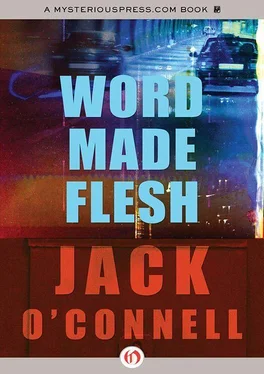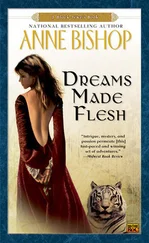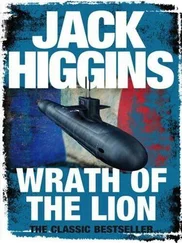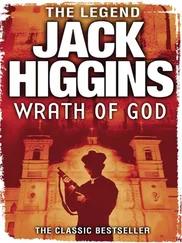c/o Sanctuary, Ltd.
Brockden Farm
City
The Midnight Hour
My Dear Gilrein:
This is the testament of a survivor. I use these particular words after much deliberation. Testament. Survivor. I use them for my purposes and I use them understanding, from the beginning, that my purposes may not be your purposes.
Shall I tell you a secret — excuse me, I was about to write “my friend.” A force of habit. Do you understand? What you would call a phraseology. We are not friends, Gilrein. This is my first confession of the night. Confession, that is from your tradition. You Catholics. You clear your soul with each trip to the box, with each transaction. Penance for absolution. Where I come from there is nothing so convenient.
Do you know the story of the Italian Jew? The poet from Turin? What was the name? Malaban? Something like this. It was in all the papers several years ago. Even here, in this bastion of reclusiveness. Only an inch of print on page twenty-two. Off the international wire. But you must have seen it. He was a writer of some renown. Had survived the ordeal at Auschwitz. Spared, apparently, when the Nazis learned of his training as a chemist. And then, forty years later, he chose to throw himself down the stairway of the home in which he had grown up. The general explanation was that he could no longer tolerate the guilt. The shame of the survivor. The remorse of the living. It’s a sad story, yes, Gilrein? You would agree? It points out the difference between the real exile and the imposter. You young men who think that because you can renounce the state and the church and the family ties that bind your freedom, you think that because you can throw off these manacles of history and conscience and love you are instantly a deportee. The despised outcast. The hated beast pushed from the village, stones and rotten fruit pelting off his back as he runs into the serpent’s forest.
You know nothing.
And your arrogance is an insult to the true outcast. You brooding romantics are more dangerous than the fascists in some ways. Can you even understand what words like mine mean in a world this hateful and corrupt, this confused as to the real and the illusory? TESTAMENT. SURVIVOR. The burden is inescapable. And unbearable.
You thought we were comrades in our great struggle against the corporate monsters, yes? You thought we would fight together, you and I and Miss Jocasta. The last of the independents. That we were a collective David who could bring down the Red and Black Goliaths. So pathetic I do not know whether to laugh or vomit. You lover of sto ries.
At the Cabaret, I asked the audience a question. Do you remember, Mister Exile? I asked if anyone present could submit to the same kind of trial that the girl, Alicia, forced herself through. I tried to look out at the faces in the crowd, but with the spotlight, well, you can imagine my difficulty. So I could only answer for myself.
I could not submit to the test Alicia willingly took.
And I did not.
Do I anticipate you? Are you already asking yourself — how does he know all that he knows? It is a perceptive question for a cabdriver. If the girl was the only witness, how can Langer know these details?
Perhaps I am making the whole thing up. Isn’t that the easiest answer? In any event, you will have to bear with me, Gilrein. This is the price one must pay for being on the receiving end of the story. There is profit and loss in each transaction. And I am forced, by my experience, by my view of the world at this advanced age, to label story-telling — what others might call an art — simply another transaction. I would allow that it is a purchase and sale steeped in tradition, in history, and birthed in the bloody membrane of our collective, superstitious unconscious. But it is still NOTHING more than a covenant. Between the one who has the specific words. And the one who does not.
Can you guess which category you fall into, Mister Gilrein?
Are you beginning, finally, to see why I hate you so much? Can you imagine all those nights I spent at that miserable table at Tang’s Diner, looking across at you, the loss of your precious wife always barely, badly, concealed just beneath the skin of your forehead. Like a tumor. A growth. A parasite that I could see bulging against the enclosure of your skull, the prison of your bone and flesh. All your small talk, detailing night after night the fares that rode in the back of your father’s Checker — it will never be yours, Gilrein — the supposedly funny stories. The allegedly petty outrages of backseat couplings and forgotten tips. As you gulped down one more cup of coffee. And all the time the memory of that woman — the wife you buried along with your meaning — pulsed like the third eye in the center of your pathetic face. Such a mundane, pitiful Cyclops you made.
And such a horrible and perfect mirror.
No glass could be more polished and true. I hated you because I saw myself each time I looked in your direction. Did you ever bother to see the tumor fighting to explode from my own head? Even now, I would bet my cab that you have no idea what I am talking about. How did you ever last on the police force, Gilrein? What does this say about our city that you not only wore the uniform, but were promoted?
Jocasta always wanted to hear the stories from your days working bunko. Such a funny term, “bunko.” And such an inappropriate place for one like you, cabdriver. As if Gilrein could determine the true from the false. As if this taxi-boy could ever, with all the time in this godless universe, find a way to separate, truly and surely, the real from the illusory.
Reach out to the mirror, Gilrein, and take this cup. I move it now from my hands to yours. This is part of your tradition, not mine. I was an Old Testament Jew. You are the New Testament fool. Turn the cheek and drink the sweet wine, taxi-boy. One more transaction you engage in without knowing the value of the goods involved.
Drink deeply:
Alicia kept her eyes open in a way you or I could never manage. She stayed behind the window and she never blinked while below her, they not only killed every single man and woman and child in Schiller Avenue, but insisted on erasing any trace of the Ezzenes’ existence. The soldiers actually grew tired from watching the Obliterator, had to work in shifts, take breaks, sit on the ground and smoke cigarettes, call out and point to a specific figure within the mass convulsion, a toddler in blind panic struggling to find its swallowed mother. Critique each course of the machine’s endless buffet. And Alicia watched from the attic window, helpless, and let herself be bombarded by images that were instantly transforming her into something else. A horrible and irreversible transformation. She did not blink.
And then, for three days she managed to stay hidden and awake. She gathered together every loose scrap of paper she could find in the attic. She took the pens and pencils from the soup can on her checkout desk and she began to write. She wrote as quickly as her hand could form the symbols on the page. She ignored the muscle cramp that, toward the end, would cause permanent damage to certain nerves near the base of the wrist and bring her final pages to the brink of illegibility. But she never crossed the line into illegibility. Every word, no matter how smeared and sloppy, proved legible. Completely readable. You must believe me on this point. Or, depending on the stage of our transaction at this time, you may be able to look for yourself. But I do not advise this. Remember that you have been warned. Like Lot’s wife.
Alicia found words to tell the story of the Erasure.
Now understand, and this may be the most important thing I have to tell you, Gilrein, she did not write down the facts. She did not transcribe what she saw through the window of the library. She did not relate, in words, the events that took place in Schiller Avenue on that humid night in July. She did not make a diary nor a journal. She did not engage in reportage. She wrote, instead, what we might agree to call a fiction. She told a story. Created a myth. She transformed what she had seen in the same way that she had been transformed by what she had seen. If I had anyone else to rely on, I would. But I have only you — this New World/New Testament reflection of my own self-loathing. You MUST understand this, Gilrein.What the girl wrote was something so far beyond accounting. Beyond simple journalism. She made her witnessing into a horrible art. She made a weapon of her epiphany and her transmutation. She created an evolutionary virus out of ink and paper. She put air into a trumpet that could shatter each frozen soul to hear its agonizing music.
Читать дальше












